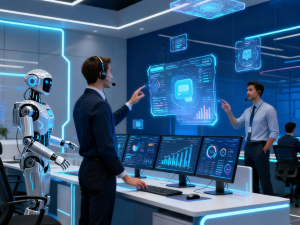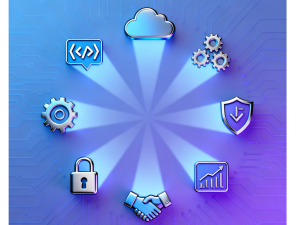We tend to imagine tech hiring as a checklist of hard skills: Python, AWS, Kubernetes, SQL. But in 2025, something surprising is happening across hiring managers and interview panels everywhere:
They’re asking about empathy.
Not just if you know how to code, but how you collaborate.
Not just if you’ve deployed to the cloud, but how you handle uncertainty.
Not just if you’ve built something, but how you handle feedback and work under pressure.
Welcome to the human edge—the qualities that AI can’t automate, but employers can’t ignore.
Why Soft Skills Are Making a Comeback
Tech has always moved fast. But now, with generative AI and automation doing more of the heavy lifting, companies are looking for what machines can’t do: connect, empathize, adapt, and lead.
From startups to enterprise teams, employers are rethinking what makes a great tech hire.
“We used to screen for the best GitHub portfolio. Now we’re just as interested in how someone handles change or mentors junior teammates,” said Elena, a hiring manager at a mid-sized SaaS company.
What Are the Human Skills That Matter Most in 2025?
Here are the soft skills currently trending in job descriptions and interview questions:
1. Empathy
Understanding team needs, thinking from the user’s perspective, and building inclusive systems.
2. Adaptability
Can you shift gears when priorities change? Learn a new tool? Work cross-functionally? This matters more than ever.
3. Curiosity
Employers want to see you’re hungry to learn, experiment, and grow—especially in emerging tech roles.
4. Communication
Clear documentation. Thoughtful feedback. Good Slack etiquette. It’s all part of being a reliable teammate.
5. Resilience
Tech projects fail. Startups pivot. How do you respond when things don’t go to plan?
How These Skills Show Up in Real Interviews
Hiring panels are getting creative.
Instead of brain teasers, they’re asking:
- Tell us about a time you had to give hard feedback to a teammate.
- How do you stay calm under pressure when a product breaks?
- What do you do when you realize you’re wrong about something at work?
These aren’t trick questions. They’re empathy checks. And they’re just as important as your ability to reverse a linked list.
Why This Matters for Career Starters and Switchers
Whether you’re a college student or a mid-career changer, you might feel overwhelmed by the technical skills needed to break into tech. But here’s some good news:
You probably already have a lot of what employers want.
- Worked in retail? You’ve practiced communication under stress.
- Managed a family? That’s multitasking and adaptability.
- Tutored a peer? That’s mentorship and empathy.
The trick is learning how to frame these experiences for a tech audience.
How to Showcase the Human Edge on Your Resume
Traditional: “Proficient in Python, Flask, PostgreSQL”
Humanized: “Built a team-based Flask app, facilitated code reviews and helped onboard two junior developers”
Use bullet points that highlight:
- Collaboration
- Cross-functional teamwork
- Problem-solving under constraints
- Leading or mentoring others
LinkedIn and Portfolios Matter Too
It’s not just about your resume.
- Share posts that reflect how you learn or overcome setbacks.
- Write about group projects and what you contributed beyond code.
- Endorse peers for their soft skills. They’ll often return the favour.
What Educators and Bootcamps Are Doing Differently
In 2025, training providers like Ascend Education are rethinking how they teach tech. That includes:
- Peer-to-peer learning
- Group project simulations
- Reflection exercises and soft skill workshops
- Interview prep focused on behavioral questions
Because passing a certification is great. But being a great teammate? That’s what keeps you employed.
Final Thoughts: The Best Tech Talent in 2025 Has a Heart
Here’s the truth: AI might write code. But it can’t listen. Or build trust. Or comfort a stressed colleague. Or take responsibility for a bug.
And that’s where you come in.
If you want to stand out in tech today, lean into your humanity. Empathy and adaptability aren’t “nice-to-haves” anymore. They’re competitive advantages.
So yes, keep learning the tech. But don’t forget the you behind it. Because in a world of smart machines, people skills are the smartest thing you can bring to the table.





